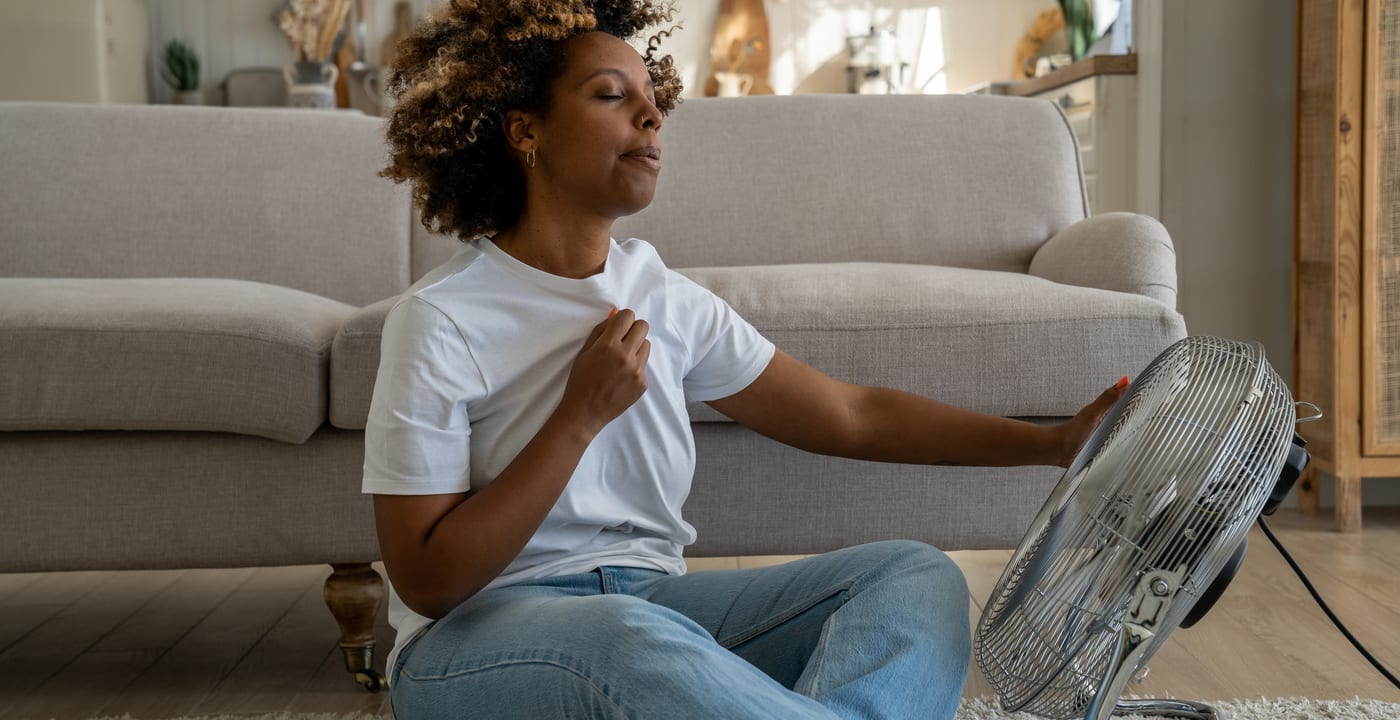Can you have a hot flash outside of menopause?

At a glance
- Hot flashes aren’t limited to women in menopause — they can happen at any age
- You don’t have to let hot flashes disrupt your life, work or sleep
- Your provider can help pinpoint a cause of your sweating and possible remedies
You’re sitting in a cool office when suddenly you find yourself flushed, ripping off your jacket and reaching for a glass of ice water. Not another hot flash, you think.
While often assumed to be a side effect of menopause, hot flashes can be caused by a multitude of things at any age, says Terese Quale, ARNP, MultiCare Rockwood Clinic – OB/GYN & Midwifery Center.
It’s often a puzzle to solve, Quale says, but you shouldn’t let that dissuade you from seeking help.
“I think women in general tend to put a lot of symptoms on the back burner because they’re busy and it’s not a big intrusion on their life at this point,” she says. “I hear it a lot from patients, that this is something they’ve been dealing with for years.”
If hot flashes are disrupting your quality of life, work or sleep; getting worse; or even just becoming a regular occurrence, Quale encourages you to talk with your doctor or other health care provider.
What is a hot flash?
A hot flash is a neurological response of the temperature-regulating center of our brain, induced by estrogen withdrawal, Quale explains. That ability to self-regulate is lessened in women who experience hot flashes.
Hot flashes will vary from person to person, including length and severity. Typically, most people will be fine one moment and suddenly hot the next without changing anything they were doing, Quale explains.
“You’ll feel overwhelmingly hot, sweating and unable to focus,” she says. “You may be able to make changes like taking off layers of clothes or turning on a fan and feel better quickly.”
In comparison, a fever lasts longer than just a few minutes. Some people may also feel hot all the time, which is not a hot flash and should be evaluated by a provider, Quale adds.
Potential causes of hot flashes
Outside of menopause, many things can lead to hot flashes. That’s why Quale gives her patients’ medical history an extensive review, discusses any health/lifestyle changes and orders a comprehensive blood panel.
“When someone under the age of 40 comes in with hot flashes, the first thing we want to do is make sure nothing more serious is going on,” she explains. “If you’re not having other changes like period, skin or hair changes, we will throw a broad net out there to check all those various things it could be.”
Quale looks at medication dosages and any recent changes; changes in your weight, eating or exercise habits; stress levels; quality of sleep; anemia; your thyroid; whether you’ve been exposed to tuberculosis or HIV; and of course your hormones, menstrual cycle and if you could be pregnant.
If your hot flashes are directly related to your cycle, such as in the days leading up to your period, that’s not typically a reason for concern, Quale adds. On the flipside, if you’re using birth control to suppress your period and are still getting hot flashes, you should speak with your provider.
Men and hot flashes
While less common, men may also experience hot flashes. If they’re intensifying or interfering with your day-to-day life, consider talking to your provider, who will likely examine your medical history and order a comprehensive blood panel to identify potential causes.
Most women begin experiencing menopause around the ages of 51-52, but some symptoms begin up to a decade prior in perimenopause, she says. Hot flashes are more likely to occur later in life because of the natural changes in your body’s ability to respond quickly to variations in temperature.
“(Patients) may try to bring it up to their provider and get told they’re too young, so they just deal with it,” Quale says. “A lot of providers who don’t work directly in women’s health still hold this assumption, but we’re working to shift that.”
You don’t have to live with hot flashes
Many people assume there’s nothing they can do — or they don’t want to take medication for hot flashes — so they don’t bring it up to their provider, Quale explains. But there are plenty of options to explore.
Complementary medicines, such as herbal supplements (for example, valerian, ashwagandha, black cohosh, bee pollen, omega-3), can be helpful in reducing hot flashes, promoting sleep and easing anxiety. Talk with your provider before taking any supplements to ensure they won’t interact with your other medications.
Some lifestyle changes may also help ease your hot flashes, especially for those who fall out of the age range for perimenopause or menopause, Quale adds. Take a look at your external stimuli, such as alcohol or caffeine intake; increase your physical activity; and/or reduce stress and sugar consumption.
Hormone therapy has many benefits for perimenopausal and menopausal women, she says. Even just a small dosage of bioidentical estradiol, which has the same chemical structure as what our bodies make naturally, has shown to be protective against conditions like cardiovascular disease and osteoporosis.
The North American Menopause Society (NAMS) considers hormone therapy to be the first line of treatment, rather than at-home measures like yoga or dressing in layers.
This is an exciting time, Quale says, because topics such as these aren’t being avoided anymore and women are realizing they don’t have to live with hot flashes like their mothers and grandmothers did.
What's next
- What to expect and how to care for yourself in menopause
- Don’t have a primary care provider to ask your questions about hot flashes? Find one
- Explore other common conditions that may or may not require a provider visit




